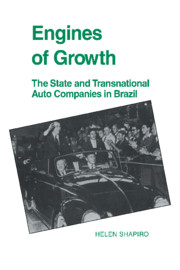Book contents
- Frontmatter
- Contents
- Tables and Figures
- Acknowledgments
- 1 Approaches to State Intervention
- 2 Why Auto?
- 3 The Determinants of Firm Entry
- 4 Rent Redistribution and Linkage Effects
- 5 The Automotive Parts Sector
- 6 Conclusion
- Appendix A Data Exhibits on the Brazilian Auto Industry
- Appendix B José Almeida's Calculation of Subsidies Provided to the Brazilian Automotive Industry
- Index
1 - Approaches to State Intervention
Published online by Cambridge University Press: 11 September 2009
- Frontmatter
- Contents
- Tables and Figures
- Acknowledgments
- 1 Approaches to State Intervention
- 2 Why Auto?
- 3 The Determinants of Firm Entry
- 4 Rent Redistribution and Linkage Effects
- 5 The Automotive Parts Sector
- 6 Conclusion
- Appendix A Data Exhibits on the Brazilian Auto Industry
- Appendix B José Almeida's Calculation of Subsidies Provided to the Brazilian Automotive Industry
- Index
Summary
In 1956, the Brazilian government banned all car imports. Foreign automobile companies faced an official ultimatum: Either they abandon the lucrative Brazilian market or they invest to manufacture vehicles with 90–95 percent Brazilian-made content within five years. The timing for such an initiative did not appear propitious. Brazil had only the beginnings of an industrial base, and until that point, virtually all vehicles had been imported as knocked-down kits and assembled locally. Steel production had begun only nine years earlier, and coffee still accounted for more than 50 percent of the country's exports. Indeed, the auto plan was part of a general import-substituting development strategy to shift the economy's focus from raw material exports to domestic industrialization. Moreover, as the first country in Latin America to insist upon domestic auto production, Brazil was entering uncharted territory. There was little precedent in Brazil or in the region for negotiating with transnational firms in any manufacturing activity. Foreign investment had been largely restricted to public utilities, railroads, and raw materials. Despite the intensification of international competition among the large auto manufacturers, cross-national investment in production facilities was occurring primarily within Europe. In the 1950s, firms competed for peripheral markets such as Brazil through exports.
In addition to these challenges, the Brazilian state's industrialization effort was constrained by chronic balance-of-payments difficulties, limited fiscal capacity, and internal divisions. The executive branch, the agent of the industrialization drive, was not hegemonic within the government apparatus and lacked full autonomy over existing resources.
- Type
- Chapter
- Information
- Engines of GrowthThe State and Transnational Auto Companies in Brazil, pp. 1 - 27Publisher: Cambridge University PressPrint publication year: 1994



